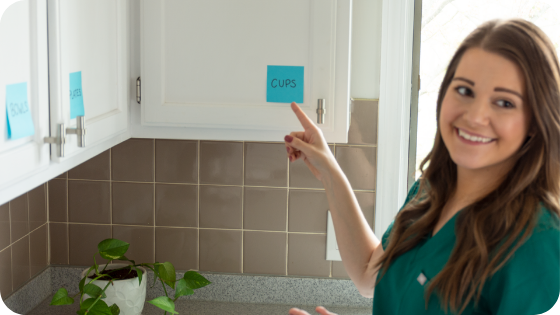5 Simple Home Modifications for Dementia
What do you do when your loved one with dementia begins to become more forgetful… When they forget where to find their favorite food in their cupboards? To take their medication in the morning? Or how to use the phone to call you? There are many simple modifications that you can make to help your loved one live successfully and as independently as possible in their home. Here are five ideas that can be implemented in just one day!
How Can I Help Memory in Dementia? Modify Your Home!
1. Use Bright, Bold Labels
Labels can be used on cupboards and drawers to help the person find what they need easier. Make sure they are bright and eye-catching and have bold lettering so they are easy to read. Here are some ideas where you can place these labels: kitchen cupboards, dresser drawers, totes or bins, closets.
2. Declutter
You can really help your loved one with memory by decluttering their home (and the added bonus of being able to physically move about their home safely). The goal is for your loved one to be able to find everything that is important, like their pillbox, and not get lost in the stack of old mail that needs to be shredded! Keep only the necessities out and focus on familiar, reminiscent-type objects that conjure happy memories. Use simple space-saving ideas like hanging family pictures on walls so they don’t take up space on tables, and using baskets to organize, like one for the remotes right next to the couch!
3. Create a “Memory Station”
This is something I start with on day one with any new client I am working with. A memory station is an area in the home where everything that is important is stored. This should be located in a high-traffic area where it will be seen often throughout the day. Some recommendations for items to put at the memory station include a digital clock that shows the date, calendar, notebook for important information, a basket to put frequently lost items including glasses, chargers, cell phone, and their pill organizer.
4. Strategic Use of Colors
The strategic use of colors can be integral in helping bring attention to important items and for overall mood! Consider painting the walls a cool, calming color like light blue, sage, or grey. Use contrasts to draw attention to important things, like putting bright tape around a light switch, or using a placemat so your loved one pays better attention to their meal. Put bright decorations on doors that may be important and lock others that you don’t want to be opened accidentally, like the basement.
5. Hang Up Reminder Signs
Using a few key reminder signs can help your loved one live more independently. For example, if they often eat too quickly, put a sign right in front of their spot at the table reminding them to take a drink after each bite. If they are now living in an assisted living facility and don’t know where they are, place a sign informing them of their location and that they are safe. If the dementia is mild, consider signs on the front door reminding them to bring their wallet with them. I recommend laminating these for durability. Lamination also has the added benefit of becoming almost like a dry erase board! Create a schedule to let them know what they need to do for the day, at what time, and place it at their memory station.
Want to learn more dementia caregiving tips? Check out this article about must-have products to help with memory and independence!
Neuro Speech Solutions is the only speech therapy private practice in Buffalo, NY that specializes in adult neurological rehabilitation. Our specialty is in brain injury, including stroke, TBI, and concussions, as well as neurodegenerative disorders such as Parkinson’s disease and dementia. All of our SLPs are dedicated to providing evidence-based aphasia therapy and cognitive therapy that will help you target the impairments you may be experiencing in a way that fits with your daily life. If you are searching for an SLP, give us a call and see what makes our practice different than the rest!
ABOUT THE AUTHOR
Katie Brown, MA, CCC-SLP, CBIS
Katie is the owner and founder of Neuro Speech Solutions. She is passionate about providing person-centered treatment to her clients in order to meet their life participation goals. Katie is dedicated to helping other SLPs provide functional therapy through affordable materials and education courses.











Were you referred to speech therapy and wondering why? Speech-Language Pathologists work on more than just speaking abilities. Read this blog to learn about how SLPs can help you with language, thinking, and swallowing.